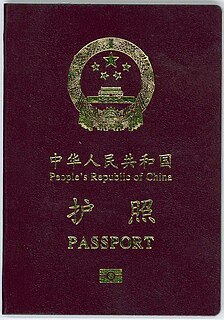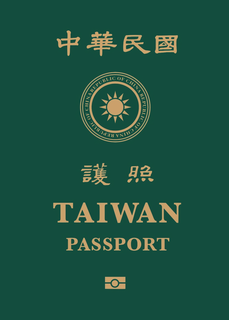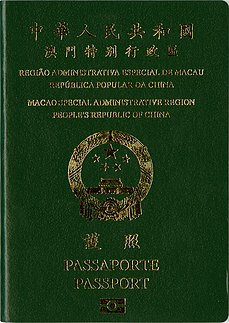The visa policy of China may refer to:
The visa policy of China may refer to:

Under the Basic Law, the Hong Kong is exclusively in charge of its internal affairs and external relations, whilst the People's Republic of China is responsible for its foreign affairs and defence. As a separate customs territory, Hong Kong maintains and develops relations with foreign states and regions, and plays an active role in such international organisations as World Trade Organization (WTO) and the Asia-Pacific Economic Cooperation (APEC) in its own right under the name of Hong Kong, China. Hong Kong participates in 16 projects of United Nations Sustainable Development Goals.

Border control is the measures taken by a state or a bloc of states to monitor its borders and regulate the movement of people, animals, and goods across the border.
Freedom of movement, mobility rights, or the right to travel is a human rights concept encompassing the right of individuals to travel from place to place within the territory of a country, and to leave the country and return to it. The right includes not only visiting places, but changing the place where the individual resides or works.

The visa policy of the Schengen Area is set by the European Union and applies to the Schengen Area and to other EU member states except Ireland. The visa policy allows nationals of certain countries to enter the Schengen Area via air, land or sea without a visa for stays of up to 90 days within a 180-day period. Nationals of certain other countries are required to have a visa either upon arrival or in transit.

The visa policy of Hong Kong deals with the requirements in which a foreign national wishing to enter Hong Kong through one of the 15 immigration control points must meet to obtain an entry permit or Visa, which depending on the traveller's nationality, may be required to travel to, enter, and remain in the Hong Kong Special Administrative Region. Visitors from over 145 countries are permitted without Visa entry for periods ranging from 7 to 180 days, to the Hong Kong Special Administrative Region for tourism or certain business-related activities. All visitors must hold a passport valid for more than 1 month.

Visa requirements for Chinese citizens are administrative entry restrictions imposed on citizens of China by the authorities of other states.

Visa requirements for Bangladeshi citizens are administrative entry restrictions imposed on citizens of Bangladesh by the authorities of other countries. As of 2 July 2019, Bangladeshi citizens who hold regular or ordinary Bangladeshi passports have visa free or visa on arrival access to 41 countries and territories, ranking the Bangladeshi passport 101st in terms of travel freedom according to the Henley Passport Index. Bangladeshi citizens who hold Diplomatic passports and/or Official passports of Bangladesh have visa free or visa on arrival access to many more countries.

Visa requirements for Taiwan passport holders are administrative entry restrictions by the authorities of other states placed on nationals of the Republic of China (ROC), commonly known as Taiwan. Although the ROC has only one type of nationality under its nationality law, its nationals' right of abode in Taiwan is based on whether they have established household registration in Taiwan, hence ROC nationals are divided into two categories: nationals with household registration ("NWHRs"), with right of abode in Taiwan; and nationals without household registration ("NWOHRs"), without right of abode in Taiwan. Only NWHRs are entitled to a National Identification Card, and the National ID number is imprinted on the passport's biodata page to signify the holder's status as an NWHR. Holders of such passports can travel to more countries and territories without visas than holders of passports without National ID number, as NWOHRs using ROC passports to enter Taiwan require an entry permit and are subject to immigration controls.

Visa requirements for Dutch citizens are administrative entry restrictions by the authorities of other states placed on citizens of the Netherlands, the joint nationality of the four countries within the Kingdom of the Netherlands. As of 13 April 2021, Dutch citizens had visa-free or visa on arrival access to 188 countries and territories, ranking the Dutch passport 6th in terms of travel freedom according to the Henley Passport Index.
Visa requirements for Hong Kong citizens are administrative entry restrictions by the authorities of other states placed on holders of Hong Kong Special Administrative Region passports.

Visa requirements for Chinese citizens of Macau are administrative entry restrictions by the authorities of other states placed on Chinese citizens who are permanent residents of Macau.

Visitors to Albania must obtain a visa from one of the Albanian diplomatic missions unless they come from one of the visa exempt countries or are qualified for visa-free entry.

Visitors to Georgia must obtain a visa from Georgian diplomatic missions unless they come from one of the visa exempt countries. or one of the countries whose citizens can obtain an e-Visa. Visitors must hold a passport valid for the period of intended stay, while Georgian citizens can enter with a valid or expired passport or identity card.

Visitors to Bosnia and Herzegovina must obtain a visa from one of the Bosnia and Herzegovina diplomatic missions unless they come from one of the visa exempt countries.
South Korea maintains a visa waiver agreement list and a designated visa-free entry list with countries not included on those lists requiring a visa to enter the country. In addition, foreigners wishing to engage in certain activities such as diplomatic work, gainful employment, study or residence must apply for the appropriate visa prior to engaging in that activity in country.

Visitors to the United Arab Emirates must obtain a visa prior to travel unless they come from one of the visa exempt countries or one of the countries whose citizens are eligible for visa on arrival.

Under normal circumstances, visitors to Kuwait must obtain a visa unless they come from one of the visa exempt countries or countries eligible for visa on arrival/eVisa. All visitors except Gulf Cooperation Council citizens must hold a passport valid for 6 months.

Visitors to Bahrain must obtain a visa in advance unless they come from one of the visa exempt countries or countries eligible for visa on arrival. Passport must be valid for 6 months from arrival and visitors must hold return or onward ticket.
Visa requirements for European Union citizens are administrative entry restrictions by the authorities of other countries placed on citizens of the European Union. They differ among countries. The European Union has achieved full reciprocity with certain countries.

The Trump travel ban denotes a series of executive actions enacted by Donald Trump as President of the United States in 2017. First, Executive Order 13769 placed stringent restrictions on travel to the United States for citizens of Iran, Iraq, Libya, Somalia, Sudan, Syria, and Yemen. Following protests and legal challenges, a second order, Executive Order 13780, amended some provisions of the first order, and removed Iraq from the list. Finally, Presidential Proclamation 9645 added restrictions on Chad, North Korea, and Venezuela, while Sudan was removed.